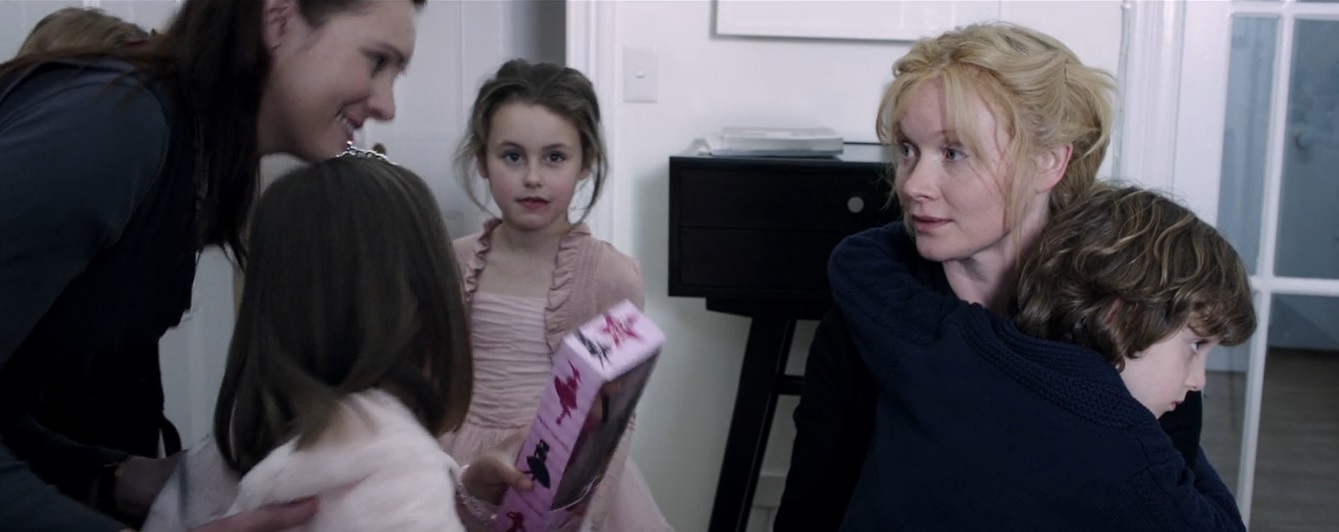By Andrea Thompson
For Week 2 of my #52FilmsByWomen project, I decided to do another rewatch. But where last week's viewing was about kicking off the project in a fun, lighthearted way, viewing the horror offering “The Babbadook” was about being made uncomfortable in entirely new ways.
Make no mistake, Jennifer Kent's “The Babbadook” aims to make you uncomfortable, and it should. In the tradition of classic horror, it uses the monstrous specter that may or may not be terrorizing widowed mother Amelia (Essie Davis) and her son Samuel (Noah Wiseman) as a vehicle for the more everyday pressures Amelia is subject to, which threaten to blossom into something truly horrific.
When the movie starts, Amelia is already beginning to break under the weight of all the responsibilities she is expected to carry. As a carer for the elderly, she nurses others for a living, while at home she must provide all the financial, emotional, and physical support for her young, troubled son. But his difficulties are not the real reason Amelia seems to have trouble bonding with him. Seven years ago, she lost her husband Oskar in a car accident en route to the hospital to give birth to Samuel. Amelia has been unable to move on, and her child has become a living reminder of what she has lost. Samuel can sense this, and his behavorial issues can be traced directly back to this one day, his birthday, and his mother's inability to fully accept what happened.
Compounding Amelia's issues is the fact that she's struggling with the two of the most taboo subjects in modern society-death and abivalence about motherhood. You're not supposed to talk about people dying, and you're not supposed to admit you have difficulty truly loving and bonding with your child. When death occurs, people are expected to firmly adhere to the rituals around it, then move on. In regards to motherhood, you are not only expected to provide an endless reserve of unconditional love and care, you are supposed to do it effortlessly and without complaint.
So when The Babbadook manifests via a terrifying children's book, it's a stand-in for not only her grief, but the mental illness that threatens to engulf her. Her isolation increases, as her work, Sam's school, the police, and even her sister seems uninterested in providing any real help. Only after her son and elderly neighbor Mrs. Roach tell her they love her unconditionally when she's at her worst is Amelia able to find the strength to fight the monster. It's no coincidence that both of them are also easily able to talk about uncomfortable topics. Mrs. Roach knows she needs support, and her son knows she needs saving.
Is the Babadook real? A shared delusion? Or just something that Amelia's mind has manifested? Much like the spinning top at the end of “Inception,” we'll never get an answer. Amelia may be able to build a happy life after her struggles, but there's no fairy tale ending. She'll have to cope with the effects for the rest of her life, but the point is that in the end she's able to have one again.
Jennifer Kent, who also wrote the film in addition to directing, is able to very eloquently capture so many aspects of the female experience. She is able to not only capture but allow us to identify with Amelia as a single mother desperately trying to protect her son even as she herself feels increasingly vulnerable. Her transformation and possible possession by the Babadook is genuinely terrifying, and Kent's terrific filmmaking abilities make it and the buildup to it truly frightening and unsettling, rather than just another stereotypical caricature of a madness very specific to women. Often when male directors try to take on women's experiences, they result in supbar offerings that involve great skill but no real insight, with “The Neon Demon” or “mother!” being a few recent examples. But Kent is able to show us the worst case scenario of a mother-child relationship going south while keeping Amelia someone worth sympathizing with and investing in. Here's hoping more filmmakers take note of how to not just make a “strong female character,” but a good one.





